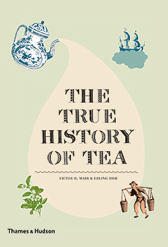“What would the world do without tea?” asked the 19th-century essayist and Anglican clergyman Sidney Smith. The question was rhetorical, expressing his love of tea and its place in English life. In a new book, The True History of Tea, Sinologist Victor Mair (with co-author Erling Hoh) suggests that the world we know would be entirely different if not for this remarkable beverage.
Mair is Professor of Chinese Language and Literature, and he specializes in Buddhist popular literature as well as the vernacular tradition of Chinese fiction and performing arts. His books include Tun-haung Popular Narratives, Painting and Performance: Chinese Picture Recitation and Its Indian Genesis, and T’ang Transformation Texts: A Study of the Buddhist Contribution to the Rise of Vernacular Fiction and Drama in China. Mair organized an interdisciplinary research project on the Bronze and Iron Age mummies of Eastern Central Asia and published The Tarim Mummies: Ancient China and the Mystery of the Earliest Peoples from the West. He recently published a new translation of Sun Zi’s classic of military strategy, The Art of War.
A single narrative of tea’s history and its impact on world history has long eluded scholars. The authors write, “With its botanical, medical, religious, cultural, economic, anthropological, social, and political dimensions, with its roots in antiquity and utter unconcern for distances and linguistic divides, the task of gathering its many strands into a single story for the general reader has always proved daunting for authors.” Mair and Hoh have plumbed the world’s libraries and archives, pulling together the perspectives of poets and priests, scientists and historians—ancient and modern—in order to tell the story of tea.
“From its humble origins in the Himalayan foothills of Southeast Asia, the salubrious tea plant has been traded by humans to every nook and cranny of the globe, and adopted by every people under the sun.” - Victor H. Mair and Erling Hoh in The True History of Tea
From the delicate peace of a Japanese tea ceremony to the near riot of the Boston Tea Party, tea has inspired artists, deepened religious experience, played a key role in the emergence of world trade and set off major wars. “From its humble origins in the Himalayan foothills of Southeast Asia,” the authors write, “the salubrious tea plant has been traded by humans to every nook and cranny of the globe, and adopted by every people under the sun. Long before it ignited the American War of Independence, it abetted the poets of China in their greatest achievements. It has burrowed itself to the core of the Japanese soul, solaced many a weary Tibetan yak herder, fueled the midnight cogitations of Britain’s greatest inventors, and offered untold numbers of Russian peasants a path to sobriety.”
In telling the tale of tea, Mair and Hoh collect quirky facts and noteworthy tea trivia, and they correct a few legends about this much-loved drink. During the Cold War, the authors report, the British military worried that as much as three-quarters of the nation’s tea supply might be threatened by a Soviet nuclear attack.
The True History of Tea places the brew somewhere between contemplation and world-shaping action. Tea provides a ritual for people to pause and reflect upon the whirl of life, and it has contributed greatly to the formation of cultures and the making of history.
What would the world do without tea? Mair and Hoh advise contemporary readers: “So, between sips, take some time to contemplate the hue of your infusion, the road those leaves have traveled both in time and space, their rich history, the confidences they have elicited, the cultural transformations they have caused, and the peace they have brokered, and reflect for a moment on the fact that millions of your fellow human beings around the planet, whether in an office, a tea house, or a desert, are also taking a break from their daily chores to enjoy a moment of the lucid repose that only tea can conjure forth.”



